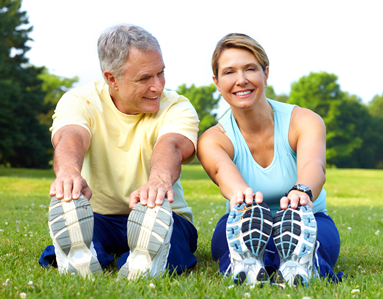Global Council on Brain Health Releases Consensus Report on Exercise and Brain Health
Research shows exercise causes positive changes in brain structure and function and lowers risk of cognitive decline
WASHINGTON, DC — Getting regular exercise can lower the risk of cognitive decline and can even change our brain structure and improve its functioning, according to a new evidence-based consensus statement issued today by the Global Council on Brain Health (GCBH). Brisk walking, cycling, strength training, and group exercise classes can provide brain health benefits, as well as overall health benefits.
“The GCBH recommends people incorporate both regular exercise and daily physical activity into their lifestyles to help reduce their risk of cognitive decline as they age,” said Marilyn Albert, Ph.D., GCBH Chair, Professor of Neurology and Director of the Division of Cognitive Neuroscience at Johns Hopkins University in Baltimore, Maryland. “Knowing there is strong scientific evidence that physical activity impacts adults’ ability to stay mentally fit should encourage people to exercise more.”
The GCBH, founded in 2015, is an independent international group of scientists, health professionals, scholars and policy experts working on brain health issues. Convened by AARP with support from Age UK, the goal of the GCBH is to review the current scientific evidence and provide recommendations for people so that they can maintain and improve their brain health.
Consensus Statement
Based on the scientific evidence, the GCBH concluded that:
- Physical activity has a positive impact on brain health.
- People can change their behavior to become more physically active at any age.
- People who participate in purposeful exercise show beneficial changes in brain structure and function.
- People who lead a physically active lifestyle have a lower risk of cognitive decline.
- There is not yet sufficient evidence that physical activity can reduce the risk of brain diseases that cause dementia, including Alzheimer’s disease.
Practical Tips
The GCBH experts recommend that people follow the current public health guidelines of 2 ½ hours each week of moderate-intensity aerobic activity that raises the heart rate (e.g., cycling, brisk walking, swimming), plus two or more days a week of moderate-intensity, muscle-strengthening activities (e.g., lifting weights, squats). In addition to weekly exercise, the experts recommend that people lead a physically-active lifestyle each day (e.g., walking, using the stairs, gardening).
Other practical tips for people who are not currently exercising or are physically inactive include:
- Slowly increase your level of activity challenging yourself more over time.
- Try new physical activities and exercises that you think you will enjoy.
- Take the stairs instead of the elevator whenever possible.
- Engage in a variety of exercises, including strength training, aerobics, and those that improve flexibility and balance.
- Consider doing physical activities and exercise with other people to help stay motivated.
- Be patient and persistent.
“We know that the desire to stay mentally sharp is the number one concern for older adults,” said Sarah Lock, AARP Senior Vice President for Policy, and GCBH Executive Director. “The GCBH report shows us that staying physically active throughout the day and getting weekly exercise can help our brain health as we age,” said Lock.
The full GCBH recommendations can be found here:www.globalcouncilonbrainhealth.org
# # #
About AARP
AARP is a nonprofit, nonpartisan organization, with a membership of nearly 38 million that helps people turn their goals and dreams into 'Real Possibilities' by changing the way America defines aging. With staffed offices in all 50 states, the District of Columbia, Puerto Rico, and the U.S. Virgin Islands, AARP works to strengthen communities and promote the issues that matter most to families such as healthcare security, financial security and personal fulfillment. AARP also advocates for individuals in the marketplace by selecting products and services of high quality and value to carry the AARP name. As a trusted source for news and information, AARP produces the world’s largest circulation magazine, AARP The Magazine and AARP Bulletin. AARP does not endorse candidates for public office or make contributions to political campaigns or candidates. To learn more, visit www.aarp.org or follow @aarp and our CEO @JoAnn_Jenkins on Twitter.
Media Contacts:
Greg Phillips, 202-434-2560, media@aarp.org, @AARPMedia
























































